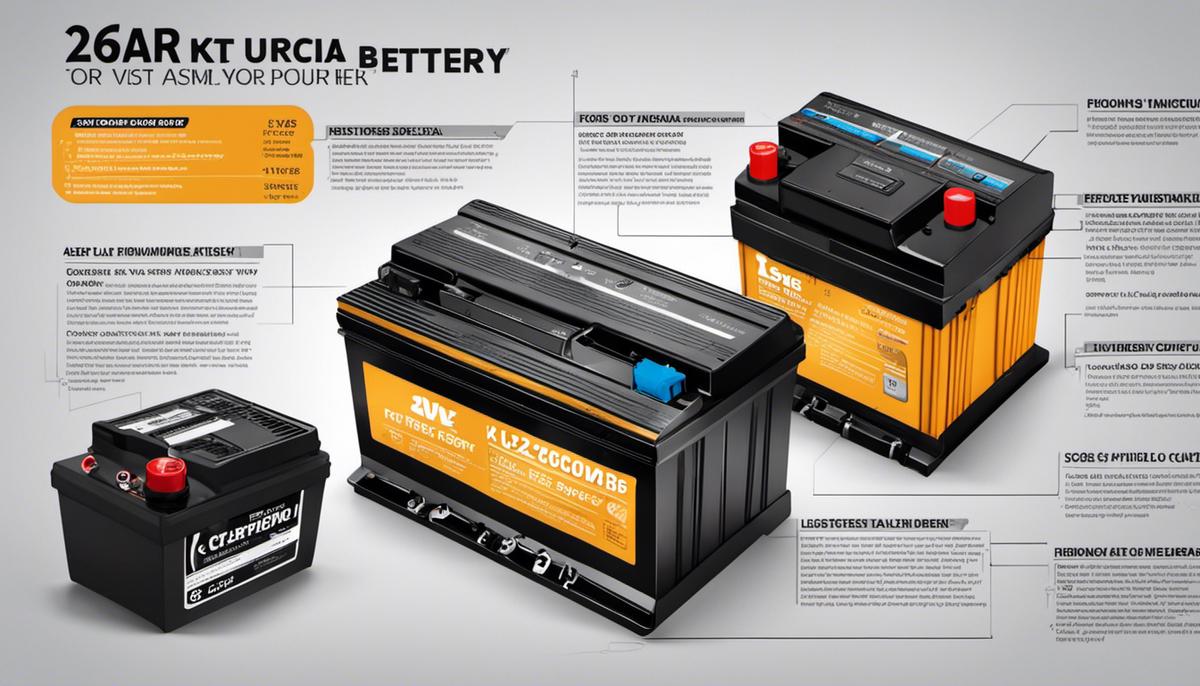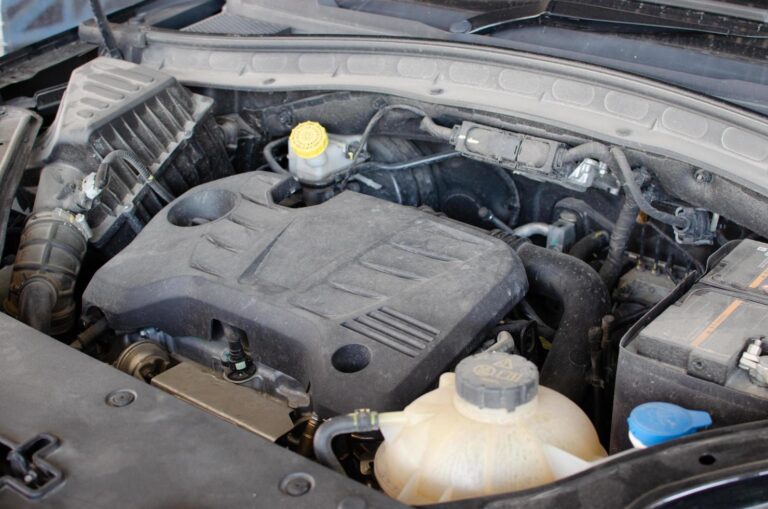
Mastering 12V Car Batteries: A Comprehensive Guide
Transporting us to work, school, the grocery store, and countless other places, our automobiles become an essential part of our daily lives. Within the intricate system that enables smooth operation of this machine, rests the humble yet significant 12v car battery. This unsung hero, often overlooked, remains the heart of the vehicle, powering all electrical parts and breathing life into the ride. In this informed piece, we delve into the core aspects of the 12v car battery, examining its core purpose, the chemical reactions it thrives on, and its technical specifications. Furthermore, we explore issues such as maintenance, lifespan, and performance influencing factors, and ultimately, we guide you through choosing the right battery and safely installing it.
In this article
Understanding the Basics of a 12v Car Battery
An Introductory Guide to 12v Car Batteries
A 12v car battery, or a lead-acid battery as it’s technically called, is a rechargeable power source that produces the electrical current needed to start a vehicle’s engine. In this context, 12v (12 volts) denotes the force of the battery’s electrical potential difference, which empowers the functions, such as igniting the engine and operating the car’s electronics.
The battery operates through a chemical reaction involving six cells, each producing approximately 2.1 volts, summing up to a total output of 12.6 volts when fully charged. Each cell consists of a lead dioxide-coated positive plate and a sponge lead-coated negative plate, submerged in a sulfuric acid solution. The chemical reaction between the sulfuric acid and lead plates creates lead sulfate, producing electricity when the car is ignited.
This process is reversible; as the car is running, the alternator charges the battery, converting lead sulfate back to lead and sulfuric acid. This bidirectional process makes the car battery rechargeable.
Safety measures are essential features of 12v car batteries. They produce hydrogen gas while charging, which can lead to explosions under certain conditions. Therefore, modern battery designs include venting systems for safely dispensing this gas.
Specifications of a 12v car battery depend on the model and car type. Usually, car batteries measure about 10 inches long, 7 inches wide, and 8 inches high. They weigh between 30 to 50 pounds and the energy capacity, indicated in ampere-hours (Ah), ranges from 40Ah to 100Ah.
The battery’s lifespan depends on various factors. Generally, these batteries last for three to five years, but weather, vehicle electrical demand, driving habits, and battery maintenance can influence the actual lifespan.
It’s essential to note that the battery’s performance can deteriorate in extreme temperatures. In cold weather, the battery’s efficiency reduces, potentially causing difficulty in starting your car. Regular maintenance and timely replacement are necessary for optimal functioning.

Maintenance and Lifespan of a 12v Car Battery
The Lifespan of a 12V Car Battery
Typically, a 12v lead-acid car battery lasts three to five years. However, various factors influence this average lifespan, including the owner’s driving habits, the climatic conditions, and the maintenance practices employed. More sophisticated modern vehicles and hybrids place a higher demand on the battery, which can hasten the battery’s wear and potentially decrease its lifespan. Therefore, it is key to note that the lifespan of the battery ultimately relies on the specifics of its use.
Battery Degradation Over Time
Over time, several issues can lead to the degradation of your car battery. The most common cause of battery failure is sulfation, which occurs when the battery is not fully charged and the sulfuric acid forms into crystals that eventually coat the lead plates, impacting their ability to function. Excessive heat can also speed up the degradation process by damaging and warping the internal components. Lastly, degradation can occur through normal wear and tear, which is generally the result of vibration, harsh weather conditions, and frequent short drives that prevent the battery from fully recharging.
Signs of Wear and Tear
There are several telltale signs that your car battery is showing symptoms of wear and tear. Difficulty in starting the engine is the most common sign. Other symptoms include the dimming of headlights and interior lights, malfunctioning electrical components, a bloated battery case, and an unpleasant, pungent smell around the battery area, which can indicate a battery leak.
Maintenance Procedures
Maintaining your car battery requires a few simple, yet critical procedures. Firstly, ensure that the battery is always fully charged, either by driving your car long enough for the alternator to recharge the battery or by using a battery charger. Secondly, routinely cleaning the battery terminals can prevent rust and corrosion, thus preserving the battery’s performance. Minor corrosion can be cleaned with a mixture of baking soda and water. A professional should be consulted for major corrosion issues. Lastly, ensuring the battery is secured properly can prevent damaging vibrations.
When to Replace
The need to replace a car battery can be discerned by it consistently failing to start, an engine that cranks but doesn’t start, electronic components malfunctioning, or needing to jump-start the battery on a regular basis. A professional load test can be performed to check the battery’s health and capacity. Typically, one should consider replacing the battery every four years as a preventative measure.
Keeping an eye on a 12v car battery, and performing regular checks and maintenance is crucial for its efficient functioning and longevity. Detecting signs of deterioration at an early stage allows for proactive battery treatment and replacement when necessary, helping to keep vehicle downtime to a minimum.

What Factors Can Affect Battery Performance
The Impact of Weather on a 12v Car Battery’s Performance
The operational efficiency of a 12v car battery can be significantly influenced by weather conditions. When exposed to extreme temperatures – either scorching hot or freezing cold – a car battery may underperform. Under chilly conditions, the chemical reactions within the battery become sluggish, which results in reduced energy generation. At times, extreme cold might result in the battery not being able to produce a sufficient amount of energy required to start the car. On the other hand, sweltering weather can accelerate the internal discharge process, leading to overheating and evaporation of vital battery electrolytes.
Impact of Driving Habits on Battery Performance
Driving habits significantly affect battery life and performance. Frequent short trips are one of the leading causes for a shortened lifespan as the battery doesn’t have a chance to fully recharge. This can cause sulfate deposits to build up on the plates of the battery which inhibits its ability to hold a charge. On the other hand, infrequent driving or leaving your car idle for a long time can also reduce battery performance and lifetime. Longer drives at higher speeds allow the alternator time to recharge the battery and help it maintain optimum performance.
Effect of Vehicle Accessories on Battery Performance
Many modern vehicles include a variety of battery-powered extras such as GPS systems, dashboard cameras, and upgraded audio systems. Such gadgets can consume a large amount of power even when the automobile is not in use, putting additional strain on the battery. Therefore, a large number of accessories can reduce the overall lifespan of a car battery. It is essential to turn off all unnecessary accessories when the car is not in use, especially for prolonged periods, to avoid draining the battery.
Identifying and Resolving 12V Car Battery Issues
Battling a dead battery is a common issue faced by many car owners. This can usually be linked back to interior lights or other accessories that remain on long after the car is shut down. A quick fix for this issue normally involves jump-starting the vehicle. However, habitual battery death is indicative of the need for a battery replacement.
The performance of the battery can be significantly affected by corrosion around the battery terminals. Upon detection, clean the corrosion with a solution of baking soda and water, also utilizing a wire brush to guarantee a dependable connection between the battery and your car.
If you encounter issues while starting your vehicle, particularly in colder climates, this can be attributed to a faulty or underperforming battery. During such instances, warming up the vehicle might work, or professional assistance may be needed if the battery is beyond reviving.
Signs of a serious battery problem can be inconsistent power output, abnormal battery drain, or inflation of the battery case. If any of these symptoms surface, it is advisable to replace the battery promptly.

Choosing the Right 12v Car Battery and Safe Installation
Exploring the Various Types of 12v Car Batteries
Several varieties of 12v car batteries are available in the market each with their unique features. The conventional types are lead-acid batteries, absorbed glass mats (AGM) batteries, and lithium-ion batteries. The most affordable of these are the lead-acid batteries, which are dependable and feature a long life expectancy, but demand regular upkeep. AGM batteries, though pricier, boast a higher power output, necessitate minimal maintenance, and are resistant to vibrations, making them suitable for high-performance cars or those that frequently use their power for add-ons. Lithium-ion batteries, while being the priciest, are also the most power-efficient and exhibit the longest life expectancy.
Selecting a 12v Car Battery Based on Vehicle Needs
When choosing a 12v car battery, consider your vehicle’s specific requirements. This includes understanding the electrical load your car typically carries, the climate you live in, and your car’s make and model. Cars with a lot of electrical accessories, for instance, may need a battery with a higher capacity. Cold climates tend to be tougher on batteries, so a battery with a high cold cranking amps (CCA) rating might be necessary for such environments. Always consult your vehicle’s owner manual for specific battery requirements.
Checking Battery Brand Reputation
It’s essential to research different battery brands and their reputation in the market. Top brands like Optima, Exide, and Bosch are well-regarded for their performance and durability. Look for reviews and ratings to get a sense of their reliability and lifespan.
Ensuring Proper Installation of 12v Car Batteries
Proper installation of a 12v car battery is crucial for safety and battery longevity. Always turn off the engine and disconnect the negative cable first when replacing a battery. Protective gloves and eyewear should be worn during the installation to protect against battery acid. Care must be taken to ensure that the positive and negative terminals are correctly connected to prevent damage.
Observing Safety Precautions During Battery Installation
While installing a 12v car battery, remember to observe necessary safety precautions. Never lean over a battery when charging, testing, or jump-starting as batteries can produce explosive gases. The work area should be well-ventilated. Do not smoke near batteries or expose them to open flames or sparks as they contain flammable hydrogen gas. After installation, make sure the battery is secure in the battery tray to prevent any potential movement or damage from vibration.
Proper Disposal of Old Car Batteries
Lastly, it is important to note that old car batteries need to be disposed of properly, as they contain hazardous materials. Many auto parts stores or battery manufacturers offer recycling programs, and some may even provide a discount on your new battery if you bring in your old one for recycling.

Having reached the end of our enlightening journey in the extensive world of 12v car batteries, we have learned invaluable knowledge of their operational basics, their upkeep, factors influencing their performance, and the art of selecting the correct battery and installing it safely. With this broadened understanding, not only will you navigate battery-related problems with increased ease and confidence, but you’ll also be in a better position to maximize your car battery’s performance, contributing to its lifespan. Most importantly, remember, treating your vehicle, and its heart, the 12v car battery, with caution and respect, is the cornerstone of a smooth and hassle-free driving experience.
Also, Read:
- Understanding and Connecting Your Car Battery: Positive and Negative
- The Complete Guide to the Best Car Battery Chargers
- Car Battery Leaking: What No One Is Talking About
- How to Extend the Life of Your Car Battery for Optimal Performance
- Step-by-Step Instructions for Replacing a Car Battery
- Step-by-Step Instructions for Replacing a Bike Battery
- Top 10 EV Battery Manufacturers in the World
- Best motorcycle battery in India | Detailed review
- An easy way to connect a dead car battery




